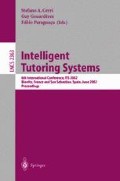Abstract
Modern e-Learning Systems are expected to be innovative not only concerning comprehensive representation of content enriched by multimedia, but also in the integration of learning situations in contexts suitable for students. Suitable, motivating contexts can be “fun” as found in strategic games or business simulations or of a more “serious” variety in the form of virtual data labs. In the new BMBF Project EMILeAstat11 (e-stat) 13 partners from different organisations are cooperating to construct such an innovative intelligent web based training (I-WBT) system for applied statistics.
This paper describes the formal specification, the architecture, and the implementation of e-stat from a knowledge and content engineering point of view, applying pedagogical and psychological criteria where necessary. Towards the end of the paper we compare our approach with an emerging e-Learning engineering approach which is based on EML a special XML-dialect.
The German Federal Ministry of Education and Research finances e-stat by means of the NMB funding program ”Neue Medien in der Bildung” (New Media in Education).
Access this chapter
Tax calculation will be finalised at checkout
Purchases are for personal use only
Preview
Unable to display preview. Download preview PDF.
References
Aviation Industry CBT Committee (AICC)
Learning Technology Standards Committee (LTSC) mit den Work Groups IEEE P1484.1 Architecture and Reference Model WG: Learning Technology Systems Architecture (LTSA) und IEEE P1484.12 Learning Object Metadata WG: LOM Standards
Alliance of Remote Instructional Authoring and Distribution Networks for Europe (ARIADNE)
BALZERT, H., Lehrbuch der Objektmodellierung, Heidelberg: Spektrum Akademischer Verlag, 1999
KOPER, R., Modelling Units of Study from a Pedagogical Perspective: The Pedagogical Meta-Model behind EML, Educational Technology Expertise Centre, Open University of the Netherlands, First Draft, Version 2, 2001
MOEBUS, C., Towards an Epistemology of Intelligent Problem Solving Environments: The Hypothesis Testing Approach, in J. Greer (ed), Artificial Intelligence in Education, Proceedings of AI-ED 95, Charlottesville: AACE, 1995
BARROWS, H.S. & TAMBLYN, R.M. Problem-based learning: an approach to medical education, New York: Springer, 1980
MOEBUS, C., SCHROEDER, O. & THOLE, H.J., Diagnosing and Evaluating the Acquisition Process of Programming Schemata, in J.E. Greer, G. McCalla (eds), Student Modelling: The Key to Individualized Knowledge-Based Instruction, Berlin: Springer (NATO ASI Series F: Computer and Systems Sciences, Vol. 125), 1994
ANDERSON, J.R., Knowledge Compilation: The General Learning Mechanism. In: R.S. Michalski et. al., Machine Learning II. Kaufman, 1986
ANDERSON, J.R., A Theory of the Origins of Human Knowledge, Artificial Intelligence, 1989
NEWELL, A., Unified Theories of Cognition, Cambridge, Mass.: Harvard University Press, 1990
VANLEHN, K., Toward a Theory of Impasse-Driven Learning, in H. Mandl et. al. (eds), Learning Issues for Intelligent Tutoring Systems, Berlin: Springer, 1988
HECKHAUSEN, H., Motivation und Handeln, Heidelberg: Springer, 1989
GOLLWITZER, P.M., Action Phases and Mind-Sets, in: E.T. Higgins & R.M. Sorrentino (eds), Handbook of Motivation and Cognition, Vol. 2, 1990
DE RAEDT, L., Interactive Theory Revision, San Diego: Academic Press, 1992
LTSA Draft 9, LTSA Home page, http://edutool.com/ltsa/, 2001
Foerderantrag an das BMBF, Foerderkennzeichen 08NM058A, 2000
JANK, W & MEYER, H., Didaktische Modelle, Frankfurt a. M.: Cornelsen Scrip-tor, 1994
BRUNS, B. & GAJEWSKI, P., Multimediales Lernen im Netz: Leitfaden für Entscheider und Planer, Berlin: Springer Verlag, 1999
BOOCH, G. & RUMBAUGH, J. & JACOBSON, I., The unified Modeling Language User Guide, Addison-Wesley, 1999
BALZERT, H., UML kompakt, Heidelberg: Spektrum Akademischer Verlag, 2001
GANTER, B. & WILLE, R., Formal Concept Analysis: mathematical foundations, Springer Verlag, 1999
PRISS, U., Relational Concept Analysis: Semantic Structures in Dictionaries and Lexical Databases, Dissertation, TH-Darmstadt
HEINRICH, E. & MAURER, H., Active Documents: Concept, Implementation and Applications, Journal of Universal Computer Sciences 6, 2000
KOPER, R., Modeling Units of Study from a Pedagogical Perspective: The Pedagogical Meta-Model behind EML, Educational Technology Expertise Centre, Open University of the Netherlands, First Draft, Version 2, 2001
KOPER, R., From Change to Renewal: Educational Technology Foundations of Electronic Learning Environments, 2000, http://eml.ou.nl/introduction/articles.htm/
Author information
Authors and Affiliations
Editor information
Editors and Affiliations
Rights and permissions
Copyright information
© 2002 Springer-Verlag Berlin Heidelberg
About this paper
Cite this paper
Moebus, C., Albers, B., Hartmann, S., Thole, HJ., Zurborg, J. (2002). Towards a Specification of Distributed and Intelligent Web Based Training Systems. In: Cerri, S.A., Gouardères, G., Paraguaçu, F. (eds) Intelligent Tutoring Systems. ITS 2002. Lecture Notes in Computer Science, vol 2363. Springer, Berlin, Heidelberg. https://doi.org/10.1007/3-540-47987-2_33
Download citation
DOI: https://doi.org/10.1007/3-540-47987-2_33
Published:
Publisher Name: Springer, Berlin, Heidelberg
Print ISBN: 978-3-540-43750-5
Online ISBN: 978-3-540-47987-1
eBook Packages: Springer Book Archive

